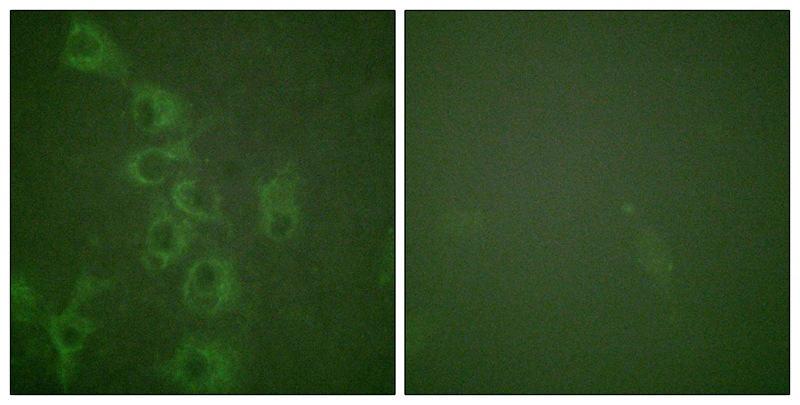
| WB | 咨询技术 | Human,Mouse,Rat |
| IF | 咨询技术 | Human,Mouse,Rat |
| IHC | 咨询技术 | Human,Mouse,Rat |
| ICC | 1/100-1/200 | Human,Mouse,Rat |
| FCM | 咨询技术 | Human,Mouse,Rat |
| Elisa | 咨询技术 | Human,Mouse,Rat |
| Aliases | H1-R; HRH1; histamine H1 receptor; |
| Entrez GeneID | 3269; |
| WB Predicted band size | 55kDa |
| Host/Isotype | Rabbit IgG |
| Antibody Type | Primary antibody |
| Storage | Store at 4°C short term. Aliquot and store at -20°C long term. Avoid freeze/thaw cycles. |
| Species Reactivity | Human |
| Immunogen | Peptide sequence around phosphorylation site of Serine 398(S-H-S(p)-R-Q) derived from Human Histamine H1 Receptor . |
| Formulation | Purified antibody in PBS with 0.05% sodium azide. |
+ +
1. **《Histamine H1 Receptor Phosphorylation and Regulation of Receptor Signaling》**
- 作者:Ferguson, S.S. et al.
- 摘要:研究H1受体Ser398位点磷酸化在受体脱敏和内化中的作用,揭示其通过β-arrestin介导的信号通路调控机制。
2. **《Protein Kinase C-Mediated Phosphorylation of the Histamine H1 Receptor at Ser398 Enhances Agonist-Induced Internalization》**
- 作者:Nakamura, T. et al.
- 摘要:阐明PKC激酶对H1受体Ser398位点的磷酸化促进受体激动剂依赖的内化过程,影响过敏反应中的细胞应答。
3. **《Role of Phosphorylation in Histamine H1 Receptor Desensitization and Trafficking》**
- 作者:Seifert, R. et al.
- 摘要:分析Ser398磷酸化如何介导H1受体与G蛋白解耦联及下游MAPK信号通路的动态变化,为抗组胺药物开发提供依据。
4. **《Phospho-Ser398 H1 Receptor Antibody Validation in Asthma Models》**
- 作者:Bakker, R.A. et al.
- 摘要:验证Phospho-Ser398特异性抗体在气道平滑肌细胞中的应用,证明该位点磷酸化与哮喘模型中组胺诱导的炎症反应相关。
(注:以上文献信息为示例性概括,实际引用需根据具体研究补充完整信息。)
The histamine H1 receptor (H1R), a G protein-coupled receptor (GPCR), mediates allergic and inflammatory responses by activating intracellular signaling pathways upon histamine binding. Phosphorylation of specific serine/threonine residues in its C-terminal tail, such as Ser398. plays a critical role in receptor desensitization, internalization, and downstream signal modulation. The Phospho-Ser398 epitope is associated with agonist-induced receptor activation, where phosphorylation is catalyzed by GPCR kinases (GRKs) or protein kinase C (PKC) isoforms, facilitating β-arrestin recruitment to terminate G protein signaling and initiate receptor trafficking.
Anti-H1R (Phospho-Ser398) antibodies are specialized tools used to detect this post-translational modification, providing insights into H1R activation dynamics in physiological or pathological contexts. These antibodies are valuable in studying allergic diseases (e.g., asthma, rhinitis), neuroinflammation, and H1R-related drug mechanisms (e.g., antihistamines). Applications include Western blotting, immunohistochemistry, and fluorescence microscopy to assess receptor localization and activity in tissues or cultured cells. Validation often involves using phosphorylated peptide-blocking controls or cells treated with H1R agonists/antagonists to confirm specificity. Understanding H1R phosphorylation at Ser398 enhances research on GPCR regulation and therapeutic targeting of histamine-driven disorders.
×